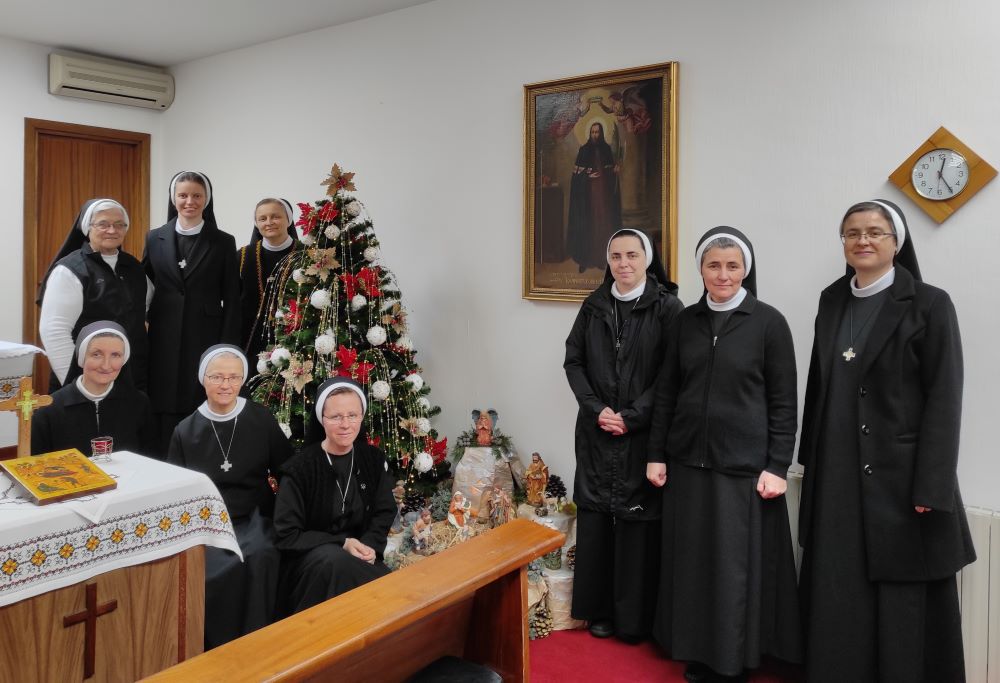
Basilian Sisters gather for Christmas 2021 in Rome. (Courtesy of Teodozija Myroslava Mostepaniuk)

(GSR logo/Toni-Ann Ortiz)
We asked this month's panel to share their congregations' customs around Christmas and New Year with the following question:
Does your congregation have any special or unusual favorite Christmas customs or New Year traditions?
This month's panelists shared stories from their communities in Canada, Croatia, India, Kenya, Lesotho, Mexico, Ukraine, the United States and Vietnam, not only for Christmas but for the Lunar New Year. It was interesting to see how many customs are spread and shared, often due to congregational history.
Merry Christmas and Happy New Year to all!
______

Mudita Menona Sodder of Mumbai belongs to the Indian Province of the Religious of the Sacred Heart of Jesus. Presently the JPIC coordinator of the Indian Province for her congregation, for the past 10 years, she has been an active member of the Justice Coalition of Religious, president of Fellowship of Indian Missiologists, and has been engaged in full-time eco-spirituality work: retreats, conferences, seminars and similar activities. Her academic background was in history, sociology, and anthropology, and she did 50 years of teaching and administration as a teacher, social worker, guide, principal, manager and adviser, with much experience in faith-based justice work and religious life.
I am a Religious of the Sacred Heart of Jesus, a French congregation with many traditions and devotions that unfold the mystery of life. Every year, as the liturgical year ends, we are filled with a spirit of Advent search and yearning to revitalize the desire for finding fellowship again, in the Lord and each other. Holiness as walking with God is uppermost in our minds.
When the first purple candle in the Advent wreath is lit, we get excited about our custom of Kris Kringle or Secret Santa. We draw names, ensuring that we do not get our own name, and declare what gift we want, a surprise or something specific. All is excitement with mystery, merriment, elvish magic, suspense, and surprise of Christmas gifting, turning average friends into sneaky elves who do good deeds and secretly place tiny gifts during Advent for their "Christ Child."

(Unsplash/Erin Mckenna)
Gifting is always better with a sprinkle of surprise and a dash of the unknown, and guessing who one's Secret Santa is and revealing one's own elf-y nature to the "Christmas Friend" is often hilarious. Knowing that someone cares and was praying all through Advent for you sends a thrill down the spine. Experiencing the tingly feeling of love and warmth and the magic of connection is the secret — why we all love Secret Santa!
The Jewish tradition of veillée (vigil) on Dec. 24 is an anticipated celebration of the Nativity of the Lord prior to midnight. The community gathers to roost and relax. Carols are sung; Christmas stories, jingles, and poems are shared; and treats are enjoyed with all awake and waiting for the coming of our Lord and Saviour, Jesus. Midnight Mass then follows.
Étrennes is a French tradition of giving gifts on New Year's Day to wish a sweet and pleasant year to the recipient. The word "Étrennes" comes from the name of the goddess Strenia or Strena, which means "valiant" or "generous." In our congregation, the community treasurer buys trinkets and stationery, displays it on a tray, and passes it around. Each one then picks up a few gifts. In India, we have a similar custom known as baksheesh, or "tips," given to the local cleaners, janitor, or postman as a sign of gratitude or bonus, which is a very thoughtful and positive action to start the new year.
Traditions, customs and rituals are important. They help reconnect, accept accompaniment with God and others, and unwrap the prophetic and mystical gift each of us are.
Candles are arranged to create a map of Ukraine during a prayer service at Ukrainian Catholic University in Lviv, Ukraine. (Antonia Zoriana Shelepylo)
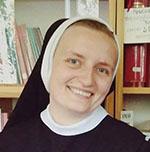
Teodozija Myroslava Mostepaniuk is a Ukrainian sister of the Order of St. Basil the Great (Province of St. Michael the Archangel, Croatia). Her academic background is in Ukrainian and English language and in religious pedagogy and catechetics. After final vows in 2018, she worked in parish ministry in Eastern Catholic parishes in Prniavor, Bosnia, and Kyiv, Ukraine. Currently, she is doing her licentiate studies in church history and teaching religious education in secondary school in Osijek, Croatia, and has contributed several columns to Global Sisters Report.
When I think about Christmas in Ukraine, the first thing that comes to my mind are carols — in Ukrainian, koliadky. In their creativity, Ukrainian folk poets made the image of Christmas very close to their daily life: Mary washes the clothes in the Jordan river, Joseph cradles the newborn Jesus, ox and donkey shiver from the winter cold. Ukrainian migrants brought these traditional carols to different parts of the world, while "Schedryk" arranged by Mykola Leontovych became the noted "Carol of the Bells."
On Christmas Eve (in Ukrainian, "Holy Evening"), when gathering for a special holy supper, Ukrainians in families and monastic communities sing carols. Various songs are strung together one after the other: solemn, cheerful, even humorous. And then the moment comes when someone starts the carol "Sad Holy Evening." It brings tears to the eyes of those present. A lighted candle is placed on the table, and a place is left in memory of those who are absent or those who have passed away.
"Sad Holy Evening in the 46th year, there was crying all over Ukraine... The old mother laments, and the children ask: 'Mom, where is our dad, why he hasn't supper?' "
This year, that carol will resonate in a special way for Ukrainian families, who will sit at the Christmas table without their fathers or mothers, sons or daughters, husbands or wives; for those who will meet Christmas for the first time far from their home abroad or in the trenches or shelters. The words, written by an unknown author in 1946 about the eviction of Ukrainians by the Russian authorities to Siberia, in a new way describes today's refugees, prisoners, sufferers.
After all, the first Christmas night was also shrouded in uncertainty, rejection and threat. The newborn Jesus was so close to us in his human vulnerability, insecurity, in the forced necessity to run away, leaving everything to save life. The birth of Christ, although it was in uncertain conditions, became a sign of joy and hope.
This Christmas Eve, as usual, the Basilian Sisters will sing carols in their religious communities: in Zaporizhzhia, Ukraine; Rome; Sydney; Philadelphia. Perhaps some will sing in the darkness without electricity, some with tears, remembering their relatives who died in the war. But all of them will proclaim the message of Christmas is that God is with us. Even if the Holy Night is still far from the Resurrection, the joy of Christmas is the star that foretells the day.

(Unsplash/Vernon Raineil Cenzon)

Ngoc Nguyen is a member of the Congregation of the Lovers of the Holy Cross in Vietnam. Before working on degrees in English, moral theology, and ethics, she organized youth liturgies, taught catechism, served as organist and choir director, and did fundraising for charity. After completing doctoral studies at Marquette University, she will teach theology for young sisters in her congregation in Vietnam.
When I was child, I was eager to celebrate the Lunar New Year because it was an occasion where grandparents and relatives would give me "lucky money" when I visited their houses to wish them a good and successful year. Lunar New Year was also the time for our parents to buy us new clothes to wear during the first days of the year.

(Unsplash/Khoi Tran)
Today, my celebration of the Lunar New Year has a significance beyond receiving money or new and beautiful clothes. Lunar New Year now is the time of reunion between Earth and heaven, between the dead and the living, and between all human beings. And it is a time of sharing with others and sharing our possessions with the poor.
The transition of time from the old year to the new is very sacred in Vietnamese culture. When the three hands of the clock meet at 12 a.m. on the first day of the new year, it is believed that there is a union or harmony between heaven and Earth. Catholics offer this time to God by attending New Year's Eve Mass. The union between God and people is expressed through the ritual of families and people choosing a piece of God's word that becomes their motto for the year.
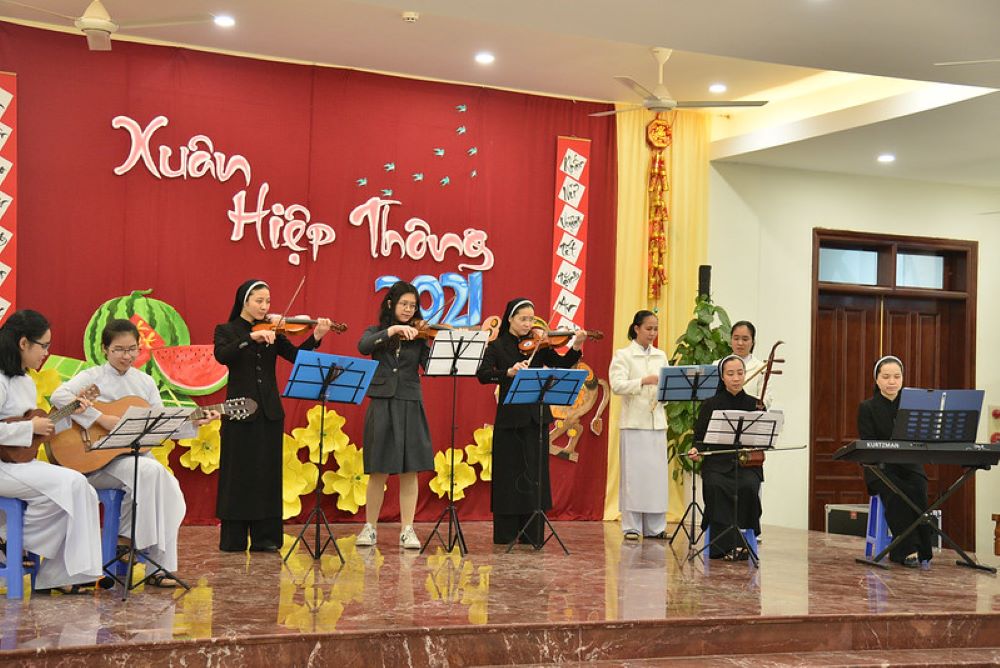
Sisters of the Lovers of the Holy Cross of Hanoi celebrate New Year 2021. (Courtesy of Archdiocese of Ha Noi)
Union between the living and deceased is also a theme of the New Year's celebration. The last week of the old year is dedicated to visiting the graves of relatives to pray, clean, offer incense or flowers, and invite the deceased home to celebrate the new year with the family. On the second day of the new year, there is a special Mass offered for the souls of our ancestors.
A final custom of the Lunar New Year is the reunion between loved ones, friends, and colleagues. These relationships are strengthened during the Lunar New Year festival by visiting each other's homes to wish friends and family good health, success, and luck. We also gather with extended family to celebrate the new year.
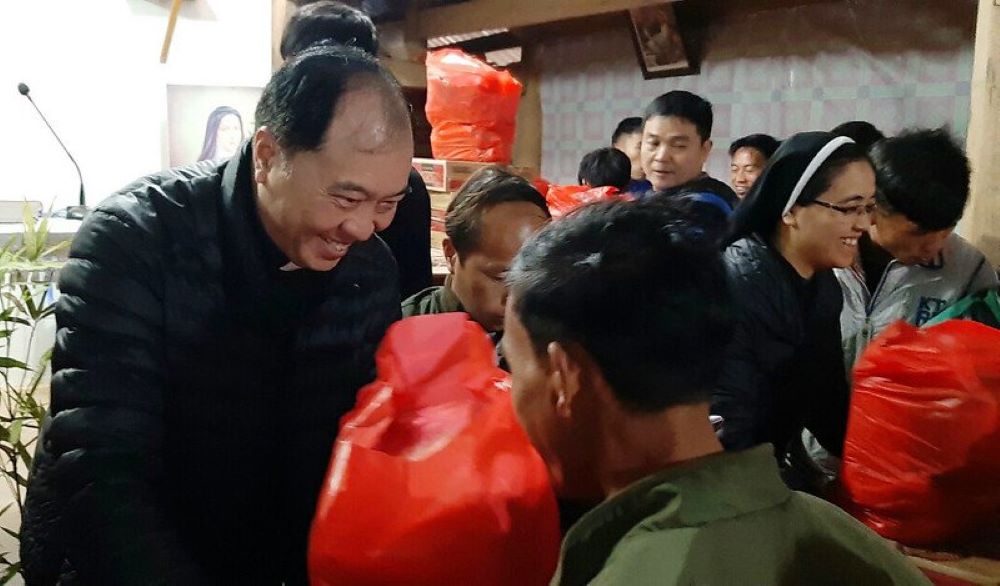
Sisters of the Lovers of the Holy Cross of Hanoi and Caritas distribute gifts to ethnic Hmong during the New Year celebration 2020. (Courtesy of Archdiocese of Ha Noi)
Upon entering religious life, our community becomes a true family. So, we remain in the convent for the first few days of the new year with our sisters, sharing with each other precious moments as we would in our other families. However, the joy of the Lunar New Year celebration must extend beyond our own families and communities.
The sisters of the Lovers of the Holy Cross of Hanoi cooperate with Caritas groups to share the gifts of the Lunar New Year with the poor. Although this sharing does not eliminate the systemic causes of poverty, we show the poor that they are included in the joy with all Vietnamese to warm their hearts and reduce their loneliness. Through the love of God, giving and reunion bring to us a deep, meaningful, and beautiful Lunar New Year.
Srs. Irène Bonenfant (left) and Florence Vinet draw names for their community's Kris Kringle Christmas gift exchange in December 2005. (Courtesy of Sisters of the Holy Names of Jesus and Mary Archives, Longueuil, Quebec)

Catherine Ferguson is a member of the Sisters of the Holy Names of Jesus and Mary. First a high school administrator and teacher, she completed doctoral work in international studies that took her to Chile, Peru and Mexico. She interned with Pax Christi in Brussels and served as associate director for Inner City Law Center in Los Angeles. She was founder and coordinator for UNANIMA International, a coalition of several sisters' congregations doing faith-based advocacy at the United Nations. She served as U.S. provincial leader and as congregational leader and is now a board member of Network, a Catholic social justice lobby.
In my more than 50 years as a Sister of the Holy Names of Jesus and Mary, I have had the opportunity during Christmastime to be in many of the seven regions where we minister. I have experienced SNJM traditions in music, food, and gift-giving.
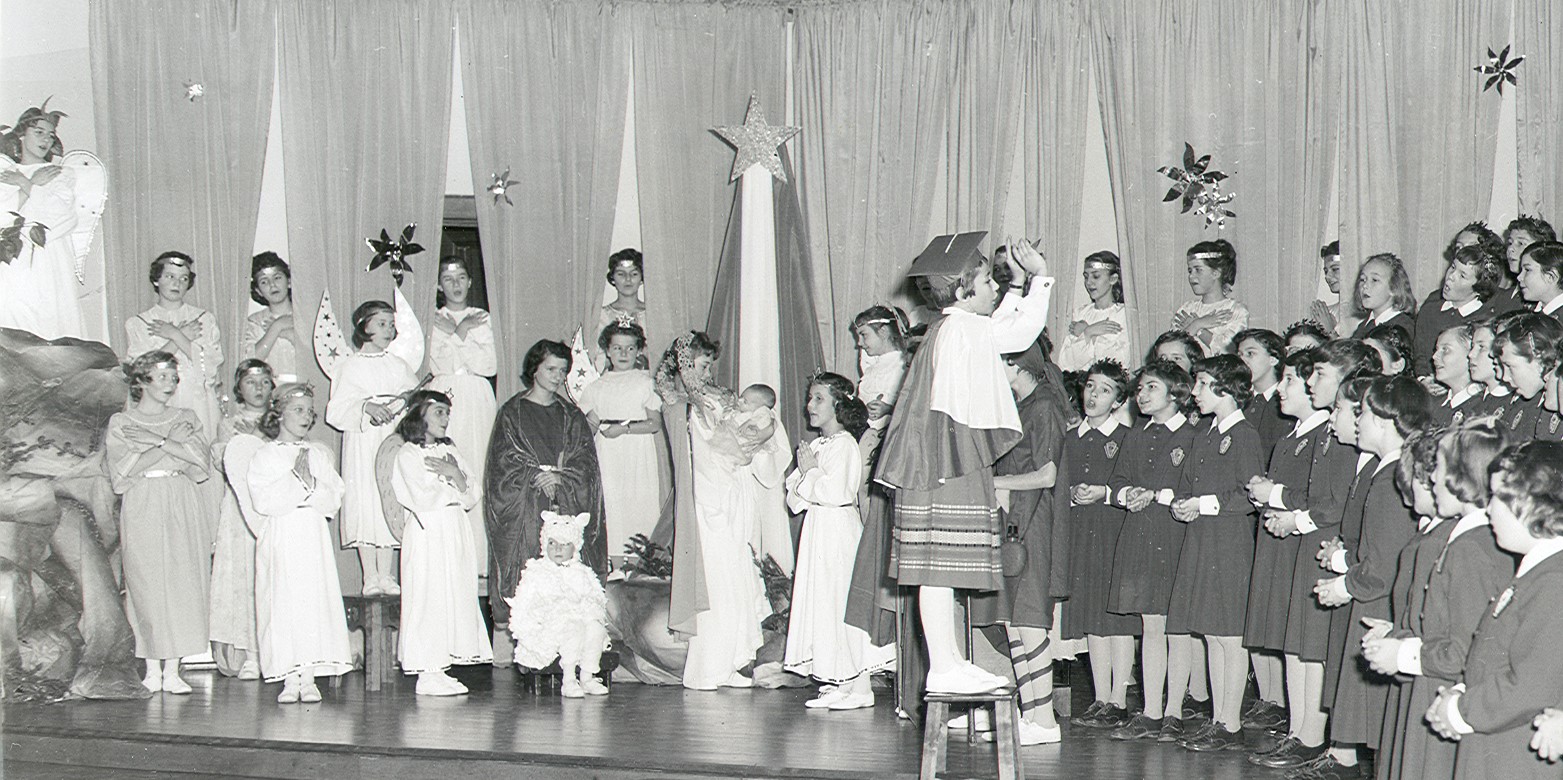
Music is an important part of the Christmas season for the Sisters of the Holy Names. Here students of the St Lambert boarding school sing during their Christmas pageant in a photo thought to be from the 1940s or 1950s. (Courtesy of Sisters of the Holy Names of Jesus and Mary Archives, Longueuil, Quebec)
Music has always been a hallmark of our community's tradition. As a young sister, when many of us entered at the same time, in our novitiate in the U.S. Pacific Northwest, we practiced long hours and sang glorious music for the Christmas Masses. Not only did we sing in three-part harmony the traditional carols of "Silent Night," "Adeste Fidelis," and "Hark! The Herald Angels Sing," but we sang polyphonic works like the Hodie Christus Natus est of Palestrina and the Gregorian chant Latin propers from the Liber Usualis. When we sang particularly well, our novice mistress used to say that our singing gave her goosebumps
Music remains a part of our Christmas traditions now but with simpler songs at a lower pitch, except in Lesotho, where we have many younger women in the community. There, our sisters carry on our SNJM musical tradition, singing joyously a cappella in many parts, accompanying themselves with drums and other rhythm instruments.
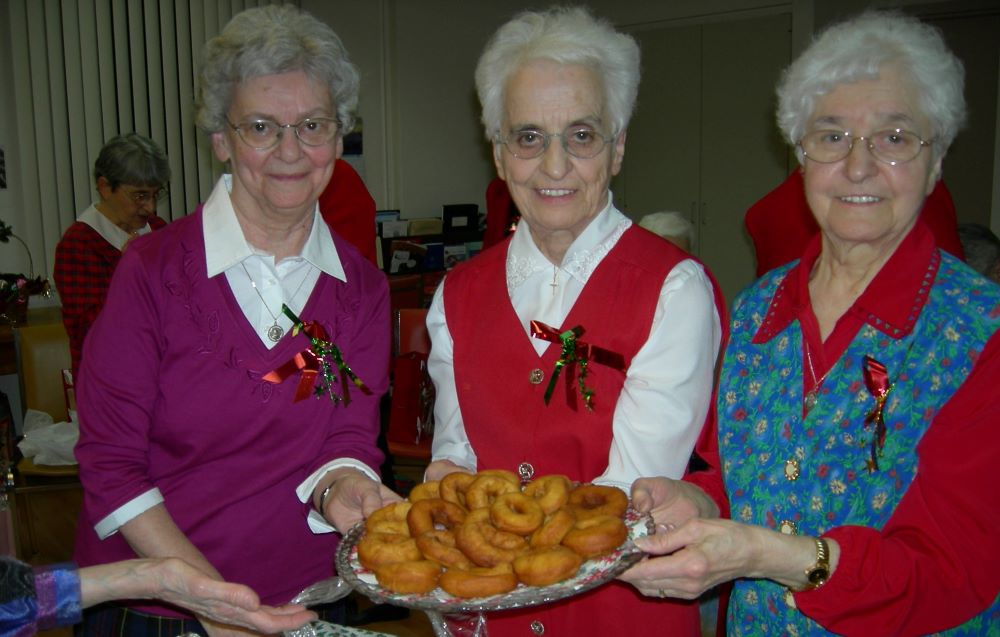
Sisters of Marie-Rose-Durocher Residence in Montreal, Quebec, offer traditional Christmas doughnuts to party guests in December 2009. (Courtesy of Sisters of the Holy Names of Jesus and Mary Archives, Longueuil, Quebec)
Many of our other Christmas traditions center around special foods for the holiday.
When I lived in our French Canadian community, I experienced some of the special treats of the Réveillon, the feast after midnight Mass. Tourtière (meat pie) and tarte au sucre (sugar pie) always found their way into the Christmas menus. Their special tradition of making old-time Christmas doughnuts shaped like diamonds folded back on each other found its way to us on the West Coast of the United States. A few of us still make them during the holidays, storing them by spiking with brandy or rum to ensure they last until the last bite.
One year, when I was in Lesotho over the holidays, they festooned the chairs in the dining room with yards of tulle, decorated the tables with special centerpieces and served a special holiday cake — something like a two- or three-layer fruit cake with a royal icing that could keep the cake fresh for several weeks.
Everywhere in the congregation, Christmas is a season for gratitude and gift giving. In some places, we draw names from a list of the others in the house or workplace early in Advent and so become one another's Kris Kringle. One Kris would do something for her Kris once a day — either give a small gift or perform a small service. Finally, just before Christmas, the group would have a party during which the "Krises" would be revealed to each other along with a final gift exchange.
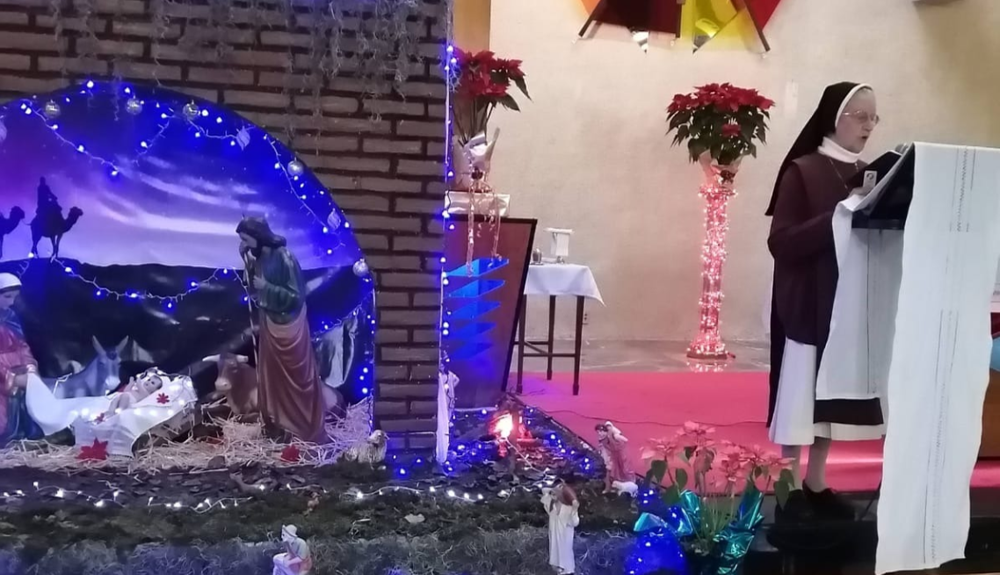
Sr Ma. del Socorro González of the Congregation of the Religious of the Incarnate Word proclaims the First Reading at the community's retreat house in Tlalpan, México. (Courtesy of Malena Galvan Gonzalez)

Maria Elena Gonzalez Galvan was born in Mexico City, where she studied interior design and social work. She entered the Congregation of the Religious of the Incarnate Word at the age of 24 and when she was newly professed was sent on mission to Kenya among the Pökot tribe. She worked in missionary animation and with young people in community apostolic works. She has done graduate studies in theology and later obtained the Diploma of Expert in Religious Life. She is currently pursuing a master's degree in missiology at the Intercontinental University in Mexico City.
In December, there is a magic that makes our hearts beat differently. We experience a joy not felt at any other time of the year, and it touches the most sensitive fibers of our being.
Thinking about that night that split history in two, one feels wrapped in a mystery that leaves us speechless. A dark night, under the stars, and especially one that announced the advent of the Son of God.
That night, in a small stable, a beautiful young married couple, tired from the journey, received, with immense joy, the arrival of their firstborn who would come to fill their little house at Nazareth with joy and hope. But it would also be the coming of God's closeness to all humanity.
Jesus, the Incarnate Word, found no better way to become human than by entering through a family. And John knew that when he proclaimed that "God so loved the world that he gave his Son" — it was the Father's greatest act of love for humankind, and he wanted to be sure that his only son would be welcomed with love.
Joseph and Mary would be that family that would receive him because love was the center of the family of Nazareth.
Advertisement
When I was a little girl, we enjoyed Christmas Eve as a family. I believe that is where the meaning and beauty of Christmas is discovered — in family. Together, we spent hours contemplating the Nativity scene that reminded us that God had become human in that little baby in Mary's arms. We prayed, shared, laughed and listened to songs that reminded us of the events in the grotto of Bethlehem.
I experienced great joy when I entered religious life and realized that Christmas was still the feast of family. We prepare Advent with care and dedication, organize ourselves to live it in the best possible way, and let ourselves be carried by the liturgy. As we light each candle of the Advent wreath, we prepare our hearts to welcome love incarnate.
Christmas is a feast of love and family, a feast of peace and humility, of light and hope.
We are the family of the incarnate word! We enjoy being together, and each member gives her gifts to make this night special because we celebrate the love of God incarnate. The most beautiful thing is that this is contagious in our apostolic works.
Yes, December is the opportunity to contemplate, live and announce that the Word of God became flesh in the heart of a family.







